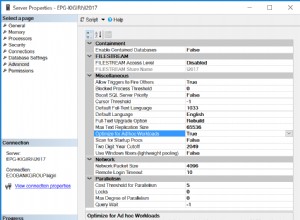Решаващият фактор за мен е дали извиквам колоните на заявката си с помощта на * .
Използване на bind_result() би било по-добре за това:
// Use bind_result() with fetch()
$query1 = 'SELECT id, first_name, last_name, username FROM table WHERE id = ?';
Използване на get_result() би било по-добре за това:
// Use get_result() with fetch_assoc()
$query2 = 'SELECT * FROM table WHERE id = ?';
Пример 1 за $query1 използвайки bind_result()
$query1 = 'SELECT id, first_name, last_name, username FROM table WHERE id = ?';
$id = 5;
if($stmt = $mysqli->prepare($query)){
/*
Binds variables to prepared statement
i corresponding variable has type integer
d corresponding variable has type double
s corresponding variable has type string
b corresponding variable is a blob and will be sent in packets
*/
$stmt->bind_param('i',$id);
/* execute query */
$stmt->execute();
/* Store the result (to get properties) */
$stmt->store_result();
/* Get the number of rows */
$num_of_rows = $stmt->num_rows;
/* Bind the result to variables */
$stmt->bind_result($id, $first_name, $last_name, $username);
while ($stmt->fetch()) {
echo 'ID: '.$id.'<br>';
echo 'First Name: '.$first_name.'<br>';
echo 'Last Name: '.$last_name.'<br>';
echo 'Username: '.$username.'<br><br>';
}
/* free results */
$stmt->free_result();
/* close statement */
$stmt->close();
}
/* close connection */
$mysqli->close();
Пример 2 за $query2 използвайки get_result()
$query2 = 'SELECT * FROM table WHERE id = ?';
$id = 5;
if($stmt = $mysqli->prepare($query)){
/*
Binds variables to prepared statement
i corresponding variable has type integer
d corresponding variable has type double
s corresponding variable has type string
b corresponding variable is a blob and will be sent in packets
*/
$stmt->bind_param('i',$id);
/* execute query */
$stmt->execute();
/* Get the result */
$result = $stmt->get_result();
/* Get the number of rows */
$num_of_rows = $result->num_rows;
while ($row = $result->fetch_assoc()) {
echo 'ID: '.$row['id'].'<br>';
echo 'First Name: '.$row['first_name'].'<br>';
echo 'Last Name: '.$row['last_name'].'<br>';
echo 'Username: '.$row['username'].'<br><br>';
}
/* free results */
$stmt->free_result();
/* close statement */
$stmt->close();
}
/* close connection */
$mysqli->close();
Както можете да видите, не можете да използвате bind_result с * . Въпреки това, get_result работи и за двете, но bind_result е по-просто и премахва част от бъркотията с $row['name'] .
bind_result()
Плюсове:
- По-просто
- Няма нужда да се забърквате с
$row['name'] - Използва
fetch()
Против:
- Не работи със SQL заявки, които използват
*
get_result()
Плюсове:
- Работи с всички SQL изрази
- Използва
fetch_assoc()
Против:
- Трябва да се забърквам с променливите на масива
$row[] - Не е толкова чисто
- изисква роден драйвер за MySQL (mysqlnd )




